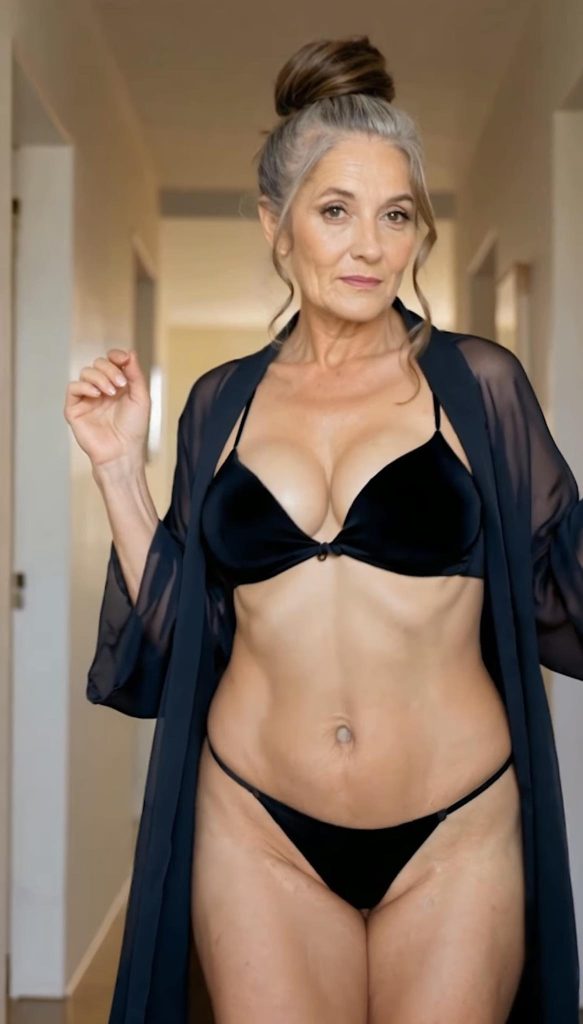The first time Aaron saw Julia, she barely looked up. She sat in the back of the café, posture straight, face composed, her eyes fixed on the steam rising from her cup. To everyone else, she looked distant—detached even. But to him, there was something different in that stillness, something that didn’t fit the label “cold.”
She wasn’t dismissive. She was just… quiet. Guarded.
For weeks, they crossed paths—at the café, on the late train, at a corner bookstore they both pretended to visit by accident. Aaron noticed the smallest things: the way Julia’s fingers tapped once against the table when she was nervous, how she brushed her hair behind her ear only when she felt seen, and how her lips parted slightly, as if words had formed but decided to hide.
That night, the city was soaked in rain. He found her standing outside the café, umbrella forgotten, her jacket clinging to her shoulders.
“Julia,” he said softly, stepping closer, holding out his umbrella.

She looked at him then—really looked—and for a second, her mask slipped. There was exhaustion in her eyes, yes, but also something raw, fragile, human.
“I’m fine,” she murmured. But her voice trembled, betraying the truth she didn’t want him to hear.
He didn’t argue. He simply moved beside her, letting the umbrella tilt just enough to cover them both. Water dripped down his sleeve, close enough that their hands brushed. She didn’t pull away.
When they reached her apartment, she hesitated before unlocking the door. “You shouldn’t have walked me,” she said, though her voice lacked conviction.
Aaron smiled faintly. “You say that like you didn’t want me to.”
Her lips twitched—the beginning of a smile, quickly swallowed. “I’m not used to people staying,” she whispered.
Inside, the air was warm, scented faintly with chamomile and rain. She hung her coat with slow precision, avoiding his gaze. Her fingers trembled slightly as she brushed water from her hair. He watched, not with hunger, but with quiet understanding.
“Julia,” he said, stepping closer. “You don’t have to keep pretending you don’t care.”
She froze. Then, slowly, she turned to face him. Her eyes were steady now, but filled with something deeper—years of disappointment, of trying too hard to be enough for the wrong people.
“I’m not cold,” she said, voice low. “I’m just tired of trying to be what people want.”
The confession hung in the air, soft but heavy. Aaron’s gaze dropped to her hands—open, uncertain—and he reached, just enough for his fingers to brush against hers. Her breath caught, and for a long second, she didn’t move. Then she let her hand stay where it was, resting lightly against his.
Her body softened—not in surrender, but in release. The tension that had held her upright for years began to fade. Her shoulders lowered. Her breathing slowed.
Aaron didn’t pull her close. He just stood there, inches apart, enough for the warmth of their bodies to mingle. Enough for her to feel seen without pressure.
When she finally spoke again, her tone had changed. “You don’t have to fix me,” she said. “Just don’t leave when I stop pretending.”
“I won’t,” he replied.
She looked at him for a long moment, then smiled—slowly, genuinely. The kind of smile that didn’t need perfection, only presence.
Her hand moved slightly, brushing the inside of his wrist, tracing the faint pulse beneath the skin. It was a small gesture, but it said everything: she was still here, still feeling, still capable of warmth even after years of self-protection.
Outside, thunder rolled in the distance. Inside, time slowed. The air felt heavier, richer—thick with the quiet electricity of two people realizing that closeness doesn’t always mean fire; sometimes it’s just the warmth of being understood.
When Aaron left later that night, Julia didn’t hide behind her usual wall of politeness. She stood at the door, hair damp, eyes soft, and said, “You’re different. You don’t make me feel like I have to be someone else.”
He smiled. “Maybe that’s because you’re already enough.”
For a long time after he left, Julia sat by the window, listening to the rain. Her reflection in the glass looked the same—composed, still—but inside, something had shifted. She was tired, yes. But for the first time in years, she didn’t feel alone in it.
He had thought she was cold.
She wasn’t.
She was just tired of trying.
And finally, someone had seen her anyway.